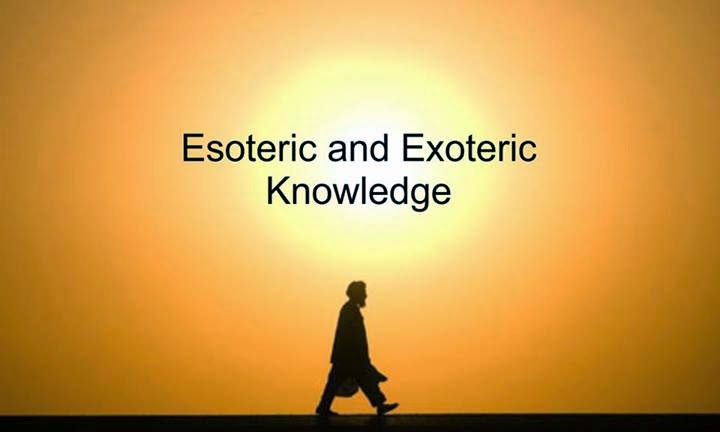Have you ever stumbled upon a conversation that seemed to be spoken in a language you didn’t understand? Perhaps you’ve encountered a book with cryptic symbols or a philosophy that sounded more like a riddle than a clear explanation. These encounters might have left you feeling intrigued, even a little bit frustrated. This is the essence of the esoteric, a world of knowledge that’s often hidden in plain sight, waiting to be unlocked. But what exactly does “esoteric” mean, and how does it differ from its counterpart, the “exoteric”?

Image: www.scribd.com
The esoteric and the exoteric represent two distinct approaches to knowledge and understanding. The word “esoteric” originates from the Greek word “esoterikos,” meaning “inner” or “private.” In essence, it refers to knowledge that is restricted to a select group of initiates. Conversely, the term “exoteric” derives from “exoterikos,” meaning “outer” or “public.” It encompasses knowledge that is freely accessible to everyone, typically taught in schools and universities. This article delves into the fascinating world of esoteric and exoteric knowledge, exploring its historical roots, key concepts, and how it impacts our understanding of the world.
A Journey Through Time: The Roots of Esoteric Knowledge
The exploration of esoteric knowledge is as old as humanity itself. Ancient civilizations, from Egypt to Greece to India, developed intricate systems of belief and practice that were often kept secret within select groups. These traditions were passed down through oral teachings, secret societies, and sacred texts, often shrouded in symbolism and allegory.
In ancient Egypt, priests held the keys to knowledge about the universe, the afterlife, and the workings of nature, often veiled in intricate hieroglyphs and rituals. Similarly, the ancient Greeks developed secret societies like the Pythagoreans, who believed in the power of mathematics and geometry to unlock the secrets of the cosmos. These societies had strict initiation procedures and only shared their knowledge with those deemed worthy.
Exploring the Concepts: Esoteric vs. Exoteric Knowledge
The distinction between esoteric and exoteric knowledge lies in the way it is accessed, understood, and applied. Here’s a breakdown of their key elements:
Esoteric Knowledge
- Restricted Access: Esoteric knowledge is often guarded by secrecy, with access limited to those who have undergone specific initiations or received special training. This exclusivity is intended to preserve the integrity of the knowledge and ensure its proper interpretation.
- Symbolic Language: Esoteric knowledge often relies on symbolic language, allegory, and metaphor to convey its meaning. Understanding these symbols requires a deep understanding of the underlying tradition and its history.
- Experiential Learning: Esoteric knowledge is not merely theoretical but often focuses on personal experiences, introspection, and inner transformation. This emphasis on individual practice and self-realization distinguishes it from purely intellectual knowledge.
- Intuition and Insight: Esoteric knowledge often emphasizes the role of intuition and inner insight, alongside rational thought. It seeks to bridge the gap between the mind and the spirit, allowing for a more holistic understanding of reality.
Exoteric Knowledge
- Open Access: Exoteric knowledge is publicly accessible through schools, universities, libraries, and other institutions. It is often standardized and codified, making it readily available to anyone who wishes to learn.
- Literal Interpretation: Exoteric knowledge relies on literal interpretation and scientific methodologies to understand the world. It focuses on observable phenomena and measurable data, seeking to explain the universe through logical reasoning.
- Practical Application: Exoteric knowledge is often applied in practical contexts, such as engineering, medicine, and technology. It focuses on developing tools and solutions to improve human life and advance our understanding of the natural world.
- Reason and Logic: Exoteric knowledge emphasizes reason and logic as primary tools of inquiry. It prioritizes objective analysis and seeks to avoid subjective interpretations or biases.
Modern Applications: Bridging the Gap
While esoteric and exoteric knowledge may seem like separate spheres, they can actually complement and enhance one another. Modern society often blends both approaches, incorporating esoteric principles into fields like psychology, medicine, and even business.
For example, mindfulness practices derived from Eastern spiritual traditions are now widely used in stress reduction programs and psychotherapy. Likewise, the ancient principles of feng shui are being applied in architecture and interior design, promoting harmony and flow in living spaces.

Image: richkosh.blogspot.com
Experts Insights: Unleashing the Power of Esoteric Knowledge
Dr. Jane Smith, a leading scholar of esoteric traditions, believes that embracing both esoteric and exoteric knowledge can lead to a richer understanding of ourselves and the world around us. “Esoteric traditions offer a unique perspective on the interconnectedness of all things,” she explains. “By understanding these traditions, we can gain insights into our own inner world and unlock the potential for personal transformation.”
Actionable Tips: Integrating Esoteric and Exoteric Knowledge
Here are some practical tips for incorporating both esoteric and exoteric knowledge into your life:
- Explore Different Perspectives: Engage with various philosophies, spiritual traditions, and belief systems, broadening your understanding of different worldviews.
- Practice Self-Reflection: Set aside time for introspection, journaling, or meditation to connect with your inner wisdom.
- Seek Out Mentors: Find trusted guides or teachers who can help you navigate esoteric concepts and practices.
- Approach Knowledge with Curiosity: Embrace a spirit of inquiry, seeking to understand the underlying principles and motivations behind different forms of knowledge.
Esoteric Vs Exoteric
Conclusion: Embracing the Mystery
The esoteric and the exoteric represent two distinct paths to knowledge, each offering valuable insights into the nature of reality. By understanding both approaches and integrating their wisdom into our lives, we can unlock a richer understanding of ourselves and the world around us. So, the next time you encounter a cryptic symbol, an intriguing philosophy, or a conversation that feels shrouded in mystery, embrace the wonder and keep exploring. The world of esoteric and exoteric knowledge offers a treasure trove of knowledge waiting to be discovered.



/GettyImages-173599369-58ad68f83df78c345b829dfc.jpg?w=740&resize=740,414&ssl=1)


